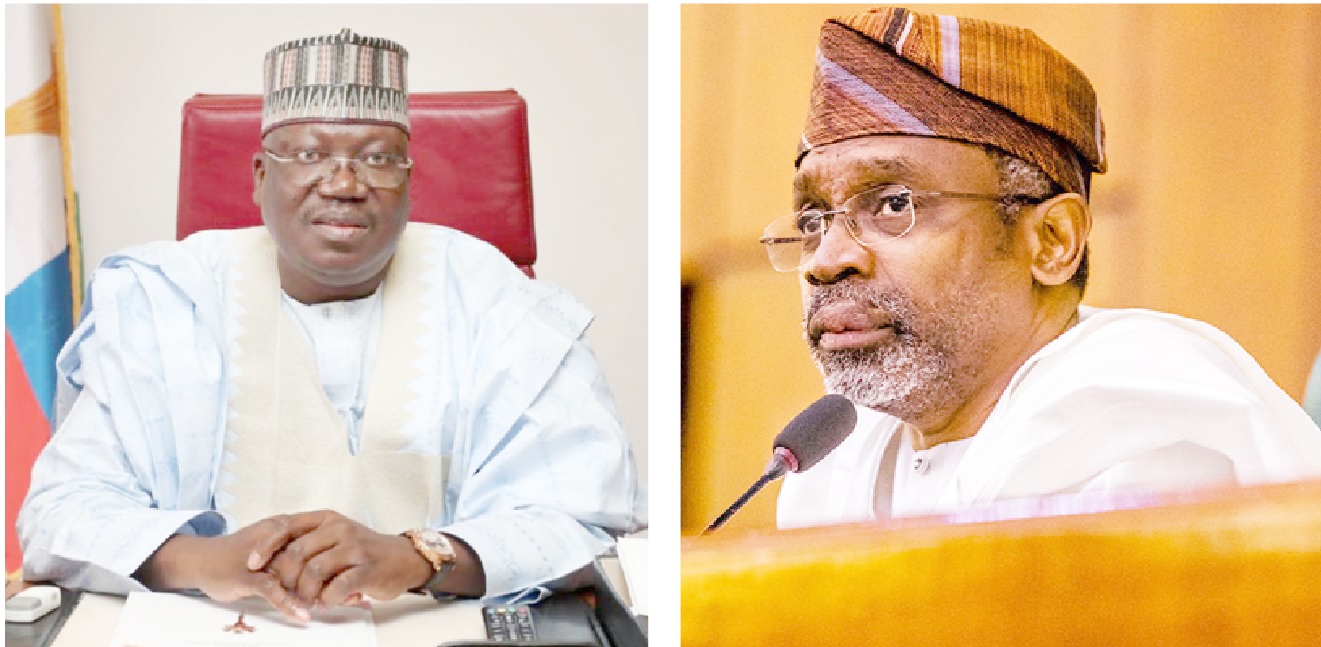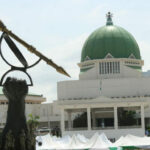For the past one month, several groups and civil society organisations have besieged the National Assembly on several occasions, demanding early passage of the electoral reform bill after the legislature failed to meet the March 2021 timeline to conclude the legislative process on it.
“Without anybody holding us responsible, we have achieved most of those things we set as targets, and electoral act amendment is one of those targets.
- Fact-check: Has debt relief been granted to African countries except Nigeria?
- Bandits kill Emir of Birnin Gwari’s driver, burn vehicle
“By the Grace of God, we will work very hard to pass it before the end of the first quarter of 2021,” Senate President Ahmad Lawan had said in a remark while declaring open a public hearing on the bill in December.
Aside from the plethora of protests at the National Assembly premises, there were several other stakeholders’ meetings calling on the federal lawmakers to fast track the process of reforming Nigeria’s electoral legal framework to facilitate inclusiveness and openness in elections.
The Electoral Act Amendment Bill has been at the centre of focus, with stakeholders calling for the overhaul of the country’s electoral system over inherent flaws and the need to introduce reforms that would usher in the use of technology and reduce unnecessary burdens.
Apart from this, the bill also seeks to, among other things, regulate the federal, states, and area council elections, as well as regulate the restriction and qualification to vie for elective offices, vis-à-vis the provisions of the constitution of the Federal Republic of Nigeria, 1999.
The concern among the electorate and other stakeholders over the fate of the Electoral Act Amendment Bill 2020 is growing despite repeated assurances by Senate President Lawan that the piece of legislation would be passed in good time.
The fear is founded on the nationwide claim that the current electoral system in Nigeria does not inspire much confidence in the electorate, worrying that any delay in concluding work on reforming the system may result in the bill suffering the same fate as the failed process in 2018.
Before the 2019 general elections, the Eighth National Assembly made spirited efforts to effect significant changes in the electoral system by further amending the electoral act, 2010.
The amendment bill was passed, but President Muhammadu Buhari vetoed it, on the ground that “Any real or apparent change to the rules this close to the election may provide an opportunity for disruption and confusion in respect of which law governs the electoral process.’’
New effort
To avoid pitfalls that frustrated the last efforts, the Ninth National Assembly had, since last year, begun another effort to amend the country’s electoral legal framework.
The bill was introduced in both chambers of the National Assembly and had since December 2020 been subjected to public hearing, which provided an opportunity for citizens and stakeholders to make their input to the electoral reform process.
The bill, therefore, seeks to amend over 300 clauses (including new provisions) of the electoral act 2010, according to its sponsors.
The bill makes provision for electronic voting. Section 52(2) seeks to introduce a new subsection, which reads: “The commission may adopt electronic voting or any other method of voting in any election it conducts, as it may deem fit.”
It seeks to enact a new section 87 on the nomination of candidates by parties for elections by prescribing maximum fees payable by aspirants and restricting nomination criteria strictly to relevant provisions.
Section 82(2) compels a political party not to impose nomination qualification or disqualification criteria, measures or conditions on any aspirant or candidate for any election, except as prescribed under sections 65, 66, 106, 107, 131, 137, 177 and 187 of the 1999 Constitution (as amended).
For the purpose of the nomination of candidates for election, the bill states that total fees imposed by a political party shall not exceed N1million on a House of Representatives aspirant; N2 million on a senatorial aspirant; N5 million on a governorship aspirant and N10million on a presidential aspirant.
The bill also compels the Independent National Electoral Commission (INEC) to operate an electronic database, into which all results in an election should be transmitted.
It also stipulates that data of accredited voters must be transmitted to the central database upon the conclusion of the accreditation of voters, which would be done through the use of the card reader.
The bill recommends that at the end of accreditation of voters, the “presiding officer shall transmit the voter accreditation data by secure mobile electronic communication to the central database of the commission, kept at its national headquarters.
Any presiding officer who contravenes this provision shall be liable, on conviction, to a minimum of imprisonment of at least five years, without an option of fine.”
It also seeks to restrain the INEC from shutting down the central database until all petitions arising from the elections are determined by a tribunal or court.
Other provisions of the bill include giving legal backing to the use of card readers and other technological devices during general elections and party primaries; provision of a timeline for the submission of lists of candidates and criteria for substitution of candidates; limitations of campaign expenses; addressing the omission of names of candidates or logo of political parties; criteria for substitution of candidates; disclosure of the sources of funds contributed to political parties, and dates for conducting primary elections shall not be earlier than 150 days and not later than 120 days before the date of the election.
Section 30(4), which provides for notice of election, is being amended to state that there shall not be substitution of candidates in a by-election, except where a candidate of a political party dies; the party shall submit to the commission the name of its substituted candidate within 48 hours of the death of the candidate in the form prescribed by the commission.
Section 36 (1), under the death of a candidate, is amended as follows: “If after the time for the delivery of nomination paper and before the commencement of the poll, a nominated candidate dies, the chief national electoral commissioner shall being satisfied of the fact of the death, countermand the poll in which the deceased candidate was to participate, and the commission shall appoint some other convenient date for the election within 14 days.’’
A new subsection (3) is provided thus: “If after the commencement of polls and before the announcement of the final result and declaration of a winner, a candidate dies, the commission shall, being satisfied with the fact of the death, suspend the election for a period not exceeding 21 days.
“The political party which candidate died may if it intends to continue to participate in the election, conduct a fresh primary within 14 days of the death of its candidate and submit the name of a new candidate to the commission to replace the dead candidate.’’
There is also another piece of legislation: “The Electoral Act (amendment) Bill, 2021 (SB. 680)’’ sponsored by Senate spokesperson, Ajibola Basiru seeks to amend the 1999 Constitution with a view to making the use of card readers compulsory for elections in Nigeria.
Panel preparing final draft
It was gathered that the relevant committees of both chambers are putting finishing touches on the salient issues raised at the public hearing and stakeholders’ meeting before presenting the final draft on the floor for third reading. However, there are fears that if there is any further delay in passing it, the 2023 polls will suffer the usual crisis that bedevils the previous elections without a coherent and comprehensive legal framework.
The INEC also said it was anxious to know the legal framework to govern the conduct of the 2023 general elections.
Speaking at a public hearing on the Electoral Offences Commission (Establishment) Bill last month, the chairman of INEC, Professor Mahmood Yakubu, said the release of the 2023 polls’ timetable, which it hopes to publish in November this year, would be determined by the new electoral law. He appealed to the National Assembly to expedite work on the bill.
“By the principle established by the commission, the 2023 general elections will hold on Saturday, February 18. We hope to release the timetable for the general elections immediately after the Anambra governorship election, scheduled to hold on November 6, 2021.
“In order to do so, there should be clarity and certainty about the electoral legal framework to govern the 2023 general elections. We are confident that the National Assembly will do the needful in earnest,’’ he said.
NASS assurance
The leadership of the National Assembly has, again, set another timeline for the passage of the electoral legal framework. On two different occasions, the Senate president reiterated that the bill would be passed well ahead of the next electoral cycle in 2023.
At a recent meeting with the UK Minister for Africa, James Duddridge in Abuja and while adjourning plenary for Eid-el-Fitr break on May 6, the Senate president said the Electoral Amendment Bill would be passed by the National Assembly before the end of June.
“We have been working on the Electoral Amendment Bill. It is also in our programme. We will be able to pass it before we go on summer break. We are hopeful that we would be able to pass the bill before the end of June,” Lawan said.

 Join Daily Trust WhatsApp Community For Quick Access To News and Happenings Around You.
Join Daily Trust WhatsApp Community For Quick Access To News and Happenings Around You.


